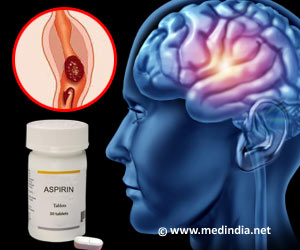Aspirin is the gold standard for antiplatelet therapy. And a daily low-dose aspirin is prescribed widely for the prevention of cardiovascular disease.

"This is one of the few cases where you can identify a single genetic polymorphism which has a significant interaction with aspirin such that it affects whether or not it protects against cardiovascular disease," says first author Kathryn Hall, PhD, MPH, an investigator in the Division of General Medicine and Primary Care at BIDMC and Research Fellow at Harvard Medical School.
COMT is a key enzyme in the metabolism of catecholamines, a group of hormones that include epinephrine, norepinephrine, and dopamine. "These hormones are implicated in a broad spectrum of disorders, including hypertension," explains Hall, "We were initially interested in finding out if the COMT gene affected people's susceptibility to incident cardiovascular disease such as myocardial infarction or ischemic stroke." Knowing that aspirin is commonly prescribed for the prevention of incident cardiovascular disease, the investigators also wanted to learn if genetic variation in COMT would influence aspirin's potential benefit.
To answer these questions, the researchers used data from the Women's Genome Health Study, a cohort of over 23,000 women who were followed for 10 years in a randomized double-blind, placebo-controlled trial of low-dose aspirin or vitamin E for the primary prevention of incident cardiovascular disease. Their analysis focused on val158met, a common variant in the COMT gene: Individuals who are homozygous for the enzyme's high-activity valine form, the "val/vals," have been shown to have lower levels of catecholamines compared to individuals who are homozygous for the enzyme's low-activity methionine form, the "met/mets,". The val/met heterozygotes are in between.
"When we examined women in the placebo arm of the trial, we found that the 23 percent of the women who were 'val/vals' were naturally protected against incident cardiovascular disease," explains senior author Daniel I. Chasman, PhD, a genetic epidemiologist in the Division of Preventive Medicine at Brigham and Women's Hospital and Associate Professor of Medicine at Harvard Medical School. "This finding, which was replicated in two other population-based studies, was in itself of significant interest." But, he adds, the investigation further revealed the surprising discovery that when the women with the val/val polymorphism were allocated to aspirin, this natural protection was eliminated.
"As we continued to look at the effects of drug allocation, we found that val/val women who were randomly assigned to aspirin had more cardiovascular events than the val/vals who were assigned to placebo," says Chasman. Among the 28 percent of women who were met/met, the opposite was true, and these women had fewer cardiovascular events when assigned to aspirin compared to placebo. The benefit of aspirin compared to placebo allocation for met/mets amounted to reduction of one case of incident cardiovascular disease for 91 treated women over 10 years of study follow-up. By contrast, the harm of aspirin compared to placebo allocation for the val/val women was an increase of one case per 91 treated.
The authors stress that the findings will require further research and replication to understand their potential for clinical impact. Nonetheless they note that given that aspirin is preventively prescribed to millions of individuals and the COMT genetic variant is extremely common, this study underscores the potential importance of individualizing therapies based on genetic profiles.
One possible reason for the val/val protection could lie in COMT's role in the breakdown of epinephrine, the "fight or flight" hormone which is tightly linked to regulation of the cardiovascular system.
"When epinephrine levels rise in response to stress, blood pressure goes up and high blood pressure is a precursor to heart disease," explains Hall. "One possibility is that val/val individuals have less epinephrine than met/met individuals because their COMT is more efficient at breaking it down. This might help to naturally protect them against cardiovascular disease – that's our working hypothesis. It's harder to explain why the effect is modified by aspirin and that's what we're in the lab aggressively trying to figure out."
Source-Eurekalert
 MEDINDIA
MEDINDIA


 Email
Email





